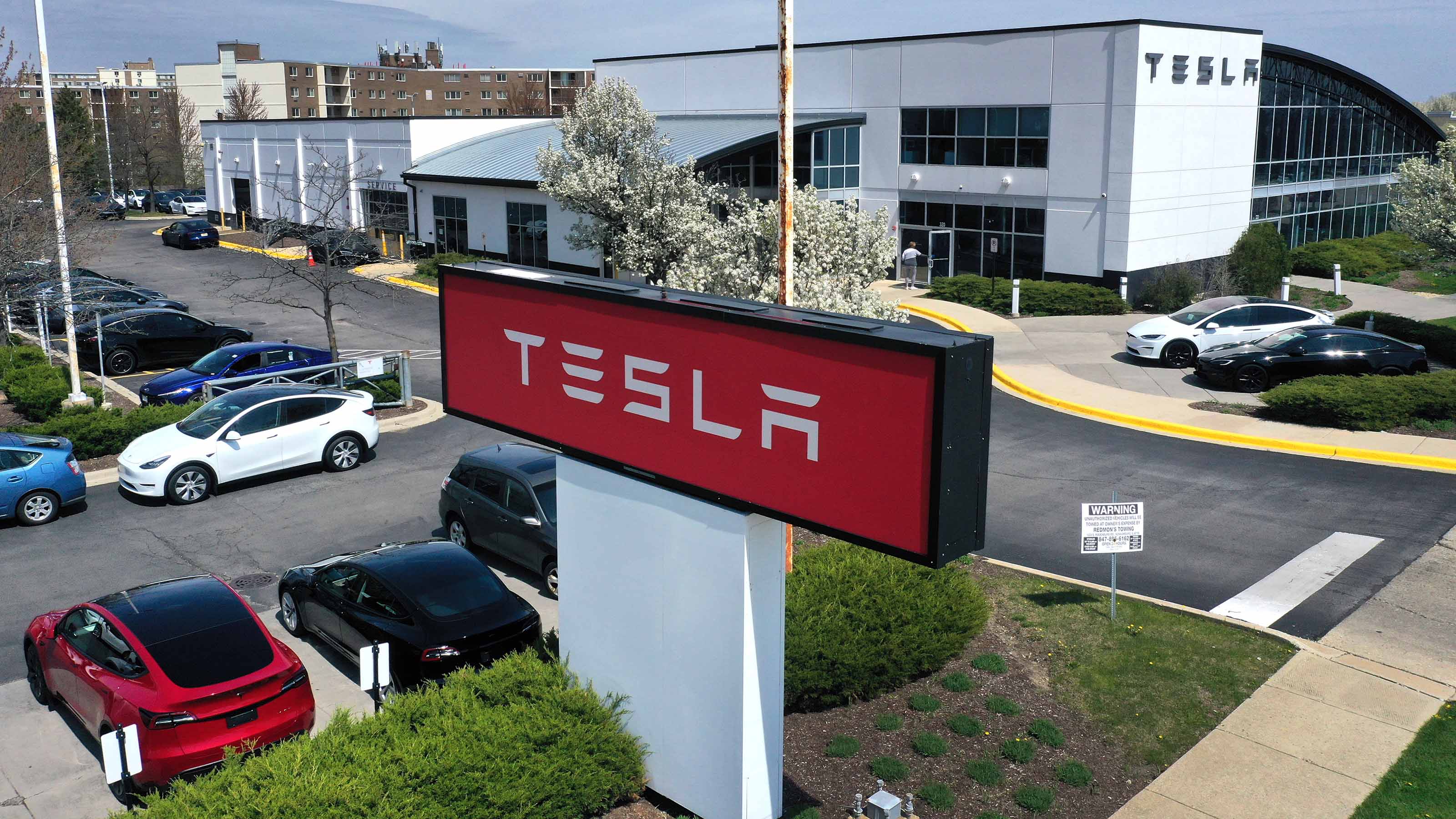Stock Market Today: Stocks Struggle After Tesla Earnings, Economic Data
Signs that consumer demand is weakening and the economy is slowing weighed on the major indexes Thursday.


Profit and prosper with the best of Kiplinger's advice on investing, taxes, retirement, personal finance and much more. Delivered daily. Enter your email in the box and click Sign Me Up.
You are now subscribed
Your newsletter sign-up was successful
Want to add more newsletters?

Delivered daily
Kiplinger Today
Profit and prosper with the best of Kiplinger's advice on investing, taxes, retirement, personal finance and much more delivered daily. Smart money moves start here.

Sent five days a week
Kiplinger A Step Ahead
Get practical help to make better financial decisions in your everyday life, from spending to savings on top deals.

Delivered daily
Kiplinger Closing Bell
Get today's biggest financial and investing headlines delivered to your inbox every day the U.S. stock market is open.

Sent twice a week
Kiplinger Adviser Intel
Financial pros across the country share best practices and fresh tactics to preserve and grow your wealth.

Delivered weekly
Kiplinger Tax Tips
Trim your federal and state tax bills with practical tax-planning and tax-cutting strategies.

Sent twice a week
Kiplinger Retirement Tips
Your twice-a-week guide to planning and enjoying a financially secure and richly rewarding retirement

Sent bimonthly.
Kiplinger Adviser Angle
Insights for advisers, wealth managers and other financial professionals.

Sent twice a week
Kiplinger Investing Weekly
Your twice-a-week roundup of promising stocks, funds, companies and industries you should consider, ones you should avoid, and why.

Sent weekly for six weeks
Kiplinger Invest for Retirement
Your step-by-step six-part series on how to invest for retirement, from devising a successful strategy to exactly which investments to choose.
Stocks opened lower Thursday as the latest batch of economic data elevated recession fears. Not helping matters was another rush of corporate earnings reports, with several notable stocks sinking in the wake of their results.
The Labor Department this morning said that weekly jobless claims rose by 5,000 last week to 245,000, more than economists were anticipating. "Jobless claims continue their steady but slow rise," says Edward Moya, senior market strategist at currency data provider OANDA. "The labor market is softening but nowhere near levels that will alleviate wage pressures, which means inflationary pressures will remain strong."
From just $107.88 $24.99 for Kiplinger Personal Finance
Become a smarter, better informed investor. Subscribe from just $107.88 $24.99, plus get up to 4 Special Issues

Sign up for Kiplinger’s Free Newsletters
Profit and prosper with the best of expert advice on investing, taxes, retirement, personal finance and more - straight to your e-mail.
Profit and prosper with the best of expert advice - straight to your e-mail.
Adding to signs of a slowing economy, the Philadelphia Fed manufacturing index for April came in much lower than expected, while March existing home sales also missed the mark.
More on Tesla earnings
On the earnings front, results from Tesla (TSLA) stole the bulk of headlines today. "Tesla's first-quarter earnings per share took a big hit, tumbling 23% from the year-ago quarter to 73 cents, however, in spite of price cuts revenues leapt 24% year-over-year to $23.3 billion," says Anthony Denier, CEO of commission-free trading platform Webull. "Margins are important for growth stocks like Tesla, and cutting the prices affected the margins, as auto gross margins came in at 18.3% vs the 20.5% Wall Street expected." Still, Tesla is beating all other automakers in both EV deliveries and profitability, Denier adds.
While most analysts remain positive toward Tesla, David Trainer, CEO of Nashville-based investment research firm New Constructs, thinks the stock has farther to fall. "Tesla's latest earnings definitively show that it is not immune to competitive challenges and will likely see lower profitability in the future," Trainer says, adding that its valuation implies the opposite. "Even in an optimistic future cash flow scenario, shares could trade as low as $28." For reference, TSLA stock slid 9.8% today to close at $162.99.
AT&T (T) is another stock that got hit after earnings, sinking 10.4%. The telecommunications company reported first-quarter earnings and revenue beats, but free cash flow of $1 billion came in well below estimates for $3.2 billion.
As for the major indexes, the Nasdaq Composite shed 0.8% to 12,059, the S&P 500 fell 0.6% to 4,129, and the Dow Jones Industrial Average gave back 0.3% to 33,786.
The best stocks for economic uncertainty
If there's one key takeaway from earnings season so far, it's that consumer demand is weakening. This is according to Robert Schein, chief investment officer of financial services company Blanke Schein Wealth Management.
"Tesla and Netflix's results are signposts for what's to come, which is a cyclical decline in discretionary spending as consumers feel the squeeze," Schein says. "Tesla has been cutting prices for its cars and Netflix added fewer than expected subscribers."
This creates plenty of uncertainty for market participants going forward, particularly as they consider the Federal Reserve's future plans for interest rates and corporate earnings in an elevated interest-rate environment, the strategist adds. Investors should "stay vigilant," Schein notes, and focus on "sectors that can fare well in many different economic climates." These, he says, include the best energy stocks, consumer staples stocks and materials stocks.
Profit and prosper with the best of Kiplinger's advice on investing, taxes, retirement, personal finance and much more. Delivered daily. Enter your email in the box and click Sign Me Up.

With over a decade of experience writing about the stock market, Karee Venema is the senior investing editor at Kiplinger.com. She joined the publication in April 2021 after 10 years of working as an investing writer and columnist at a local investment research firm. In her previous role, Karee focused primarily on options trading, as well as technical, fundamental and sentiment analysis.
-
 How Much It Costs to Host a Super Bowl Party in 2026
How Much It Costs to Host a Super Bowl Party in 2026Hosting a Super Bowl party in 2026 could cost you. Here's a breakdown of food, drink and entertainment costs — plus ways to save.
-
 3 Reasons to Use a 5-Year CD As You Approach Retirement
3 Reasons to Use a 5-Year CD As You Approach RetirementA five-year CD can help you reach other milestones as you approach retirement.
-
 Your Adult Kids Are Doing Fine. Is It Time To Spend Some of Their Inheritance?
Your Adult Kids Are Doing Fine. Is It Time To Spend Some of Their Inheritance?If your kids are successful, do they need an inheritance? Ask yourself these four questions before passing down another dollar.
-
 If You'd Put $1,000 Into AMD Stock 20 Years Ago, Here's What You'd Have Today
If You'd Put $1,000 Into AMD Stock 20 Years Ago, Here's What You'd Have TodayAdvanced Micro Devices stock is soaring thanks to AI, but as a buy-and-hold bet, it's been a market laggard.
-
 Dow Rises 313 Points to Begin a Big Week: Stock Market Today
Dow Rises 313 Points to Begin a Big Week: Stock Market TodayThe S&P 500 is within 50 points of crossing 7,000 for the first time, and Papa Dow is lurking just below its own new all-time high.
-
 Nasdaq Leads Ahead of Big Tech Earnings: Stock Market Today
Nasdaq Leads Ahead of Big Tech Earnings: Stock Market TodayPresident Donald Trump is making markets move based on personal and political as well as financial and economic priorities.
-
 11 Stock Picks Beyond the Magnificent 7
11 Stock Picks Beyond the Magnificent 7With my Mag-7-Plus strategy, you can own the mega caps individually or in ETFs and add in some smaller tech stocks to benefit from AI and other innovations.
-
 If You'd Put $1,000 Into UPS Stock 20 Years Ago, Here's What You'd Have Today
If You'd Put $1,000 Into UPS Stock 20 Years Ago, Here's What You'd Have TodayUnited Parcel Service stock has been a massive long-term laggard.
-
 How the Stock Market Performed in the First Year of Trump's Second Term
How the Stock Market Performed in the First Year of Trump's Second TermSix months after President Donald Trump's inauguration, take a look at how the stock market has performed.
-
 If You'd Put $1,000 Into Lowe's Stock 20 Years Ago, Here's What You'd Have Today
If You'd Put $1,000 Into Lowe's Stock 20 Years Ago, Here's What You'd Have TodayLowe's stock has delivered disappointing returns recently, but it's been a great holding for truly patient investors.
-
 Stocks Extend Losing Streak After Fed Minutes: Stock Market Today
Stocks Extend Losing Streak After Fed Minutes: Stock Market TodayThe Santa Claus Rally is officially at risk after the S&P 500's third straight loss.